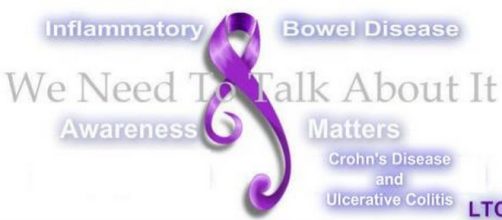Crohn's disease and Ulcerative Colitis are autoimmune diseases few people talk about. Crohn's causes inflammation and ulcers from the mouth to the anus while Ulcerative Colitis causes ulcers and inflammation in the large bowel. Ulcerative Colitis penetrates the top layers of tissue, but fissures and fistulas are common complications of Crohn's disease. Fistulas are tunnels created by ulcers that attach to other organs in the body while fissures are painful cracks in the sensitive skin around the anus.
Why is it important to spread the word?
Crohn's disease and Ulcerative Colitis can be life-threatening and both are life-changing diseases.
Either condition can strike at any age and the sufferer, without proper medical treatment, can end up without a colon and even the life-threatening condition called short bowel syndrome and/or toxic mega-colon.
Over 700,000 people in the United States have been diagnosed with an inflammatory bowel disease and the number is rising. Last year, I lost a friend to short bowel syndrome. She starved to death because her body no longer absorbed the nutrients she needed to live. Crohn's and UC are serious autoimmune diseases that are believed to be genetic combined with an unknown environmental stimulus. Researchers suspect processed food, E.Coli or some other virus and even a common condition in cows called mycobacterium tuberculosis.
Food is believed to play a part, but only in symptom control. When shopping for groceries the IBD patient is directed by physicians to stay on the outside aisles of grocery stores and to stay out of the middle isles. The outside aisles contain fresh food while the inside aisles are filled with processed food items, some of which are not even food but created products made to look like and taste like food. For IBD patients, fake food can be disastrous as they need every nutrient they can get from fresh, organic foods.
Signs and symptoms of the disease
There are flares and remission stages to both UC and Crohn's disease. Flares generally come with blood in the stool (though not always), diarrhea, abdominal pain (sometimes severe), fever, anemia, and fatigue.
With Crohn's disease, mouth and stomach ulcers can be the first sign of the condition and can be diagnosed through biopsy. While Ulcerative Colitis can be cured by removing the colon, Crohn's disease does not yet have a cure even after multiple surgeries.


